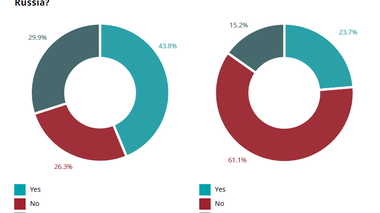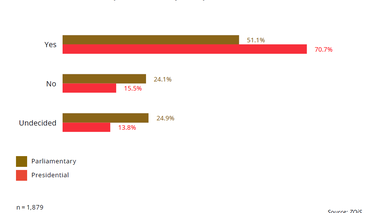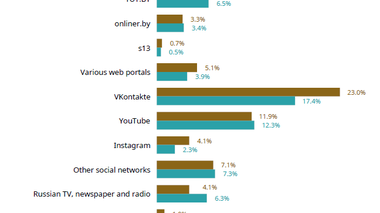Being young in an autocracy: Belarus’ new generation between East and West
The report presents the results of a ZOiS survey conducted in February 2019. Around 2,000 Belarusians aged between 16 and 34 living in the country's urban centres were surveyed.
Desire for closer ties with the EU
Nearly forty per cent of the respondents consider closer relations with the European Union to be desirable, even if this could negatively affect relations with Russia. Similarly, the majority disapproves of a possible union with Russia. Belarus and Russia signed a union treaty in 1999, the implementation of which has so far been limited to cooperation in certain areas (economy, energy sector and harmonization of legislation).
Nevertheless, ties with Russia are comparatively close. "The societal values of young Belarusians mirror norms that can be found in other East and Central European countries, but mobility and personal links remain higher with countries of the former Soviet Union," explains Félix Krawatzek, the author of the report.
Russian remains prevailing language
For most young Belarussians, language is not an overly politicised issue. While Belarusian has a certain importance and about 30% said they wished to speak it more frequently, Russian remains by far the commonest spontaneously spoken language, used by around 90 percent in public situations and only slightly less in private situations.
Knowledge of protests, low participation
Forty per cent of the respondents said they were interested in politics, 50 per cent want to participate in the parliamentary elections in autumn and 70 per cent in the presidential elections next year. Among those who did not vote, 39 per cent said their vote would not make a difference, 20 per cent said they were not interested. It is also noteworthy that despite the extensive censorship, 47 per cent of respondents had heard of political protests. However, only 3 per cent said they had taken part in protests in the last 12 months.
Online media as main source of information
In the last two years, the state's control over the Belarusian media landscape has increased, making it more and more difficult for people to obtain information. As in other European countries, young people in Belarus are mainly informed about political events via online media, especially Vkontakte (VK.com), the Russian-language Facebook counterpart, which 23 per cent use as their primary source of information, while YouTube came second mentioned by 12 per cent. 14 per cent reported Belarusian television as their primary source. Traditional Russian media where mentioned by only 4 per cent of the respondents.
Transnational links
Nearly half of the respondents indicated that they had relatives or friends in EU countries, while nearby 70 per cent had personal links to Russia. Around a third has personal connections to Ukraine. ‘These numbers underline the extent to which young Belarusians are connected internationally, a potentially important characteristic given the economic and political implication of such transnational links”, adds Krawatzek.


